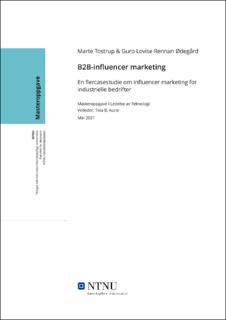| dc.contributor.advisor | Aune, Tina B. | |
| dc.contributor.author | Tostrup, Marte | |
| dc.contributor.author | Ødegård, Guro Lovise Rennan | |
| dc.date.accessioned | 2021-09-22T16:06:48Z | |
| dc.date.available | 2021-09-22T16:06:48Z | |
| dc.date.issued | 2021 | |
| dc.identifier | no.ntnu:inspera:82751215:84639115 | |
| dc.identifier.uri | https://hdl.handle.net/11250/2780542 | |
| dc.description.abstract | Studien omhandler fenomenet "influencer marketing", og hvordan dette oversettes til det industrielle markedet. Hensikten er å finne ut om det er mulig å lykkes med en influencer marketing strategi på bedriftsmarkedet, og hvor denne strategien plasseres i forhold til liknende markedsføringsstrategier. For å besvare problemstillingen, "hvordan kan bedrifter lykkes med influencer marketing på B2B-markedet?", har det blitt gjennomført en flercasestudie av to industrielle bedrifter, Norsk Hydro ASA og Lundhs AS, som drifter liknende influencer-strategier. Markedsføringsstrategiene, som casebedriftene fører, går ut på å nå viktige premissgivere og beslutningstakere ved hjelp av individer som har stor påvirkningskraft innenfor et marked. Strategien baseres på tanken om at anbefalinger fra en nøytral tredjepart har større påvirkning enn kommunikasjon fra bedriften selv.
Oppgaven forsøker å belyse faktorer som kan påvirke en industriell bedrifts evne til å lykkes med en influencer-strategi. Grunnet manglende forskning på området, vil oppgaven først fokusere på å etablere en klar definisjon av en B2B-influencer basert på teorier om "word-of-mouth", "opinion leaders" og "social selling". Videre vil strategier som "co-branding" og "network mobilization" bli benyttet til å forklare markedsføringsstrategien B2B-influencer marketing.
Gjennom presentert teori og empiri kan en B2B-influencer forklares som en opinion leader som utfører word-of-mouth kommunikasjon omkring et merke eller bedrift, med hensikt om å treffe kunden på avgjørende stadier i kjøpsprosessen. Influenceren må være en aktør som fronter virksomhetens verdier, og må treffe målgruppen som objektiv og troverdig i sammenheng med merkevaren. Objektivitet er en viktig faktor, men må balanseres med hensyn til relasjonen mellom influenceren og bedriften.
B2B-influencer marketing kan forklares som en gren av co-branding, som innebærer at flere aktører går sammen om markedskommunikasjonen om et felles produkt. Dette er også et sentralt element ved B2B-influencer marketing. Influencer marketing kan videre forklares ved mobilisering av nettverket, hvor bedriften avdekker uutnyttede muligheter i samhandling med sitt nettverk med hensikt om å etablere nye samarbeid. Influencer-strategien fokuserer på å fremme bedriftens merkevare, som understreker viktigheten av at industrielle bedrifter har en merkevare. Strategiens suksess avhenger av måloppnåelse over tid. Det er derfor avgjørende at det settes klare mål for ønsket resultat. På samme tid vil virksomhetens interne organisering være en påvirkende faktor for gjennomføring av nye strategier. | |
| dc.description.abstract | The study addresses the phenomenon of "influencer marketing", and how this translates into the industrial market. The purpose of the thesis is to find out if this is a strategy industrial companies can succeed with, and where this strategy is in relation to similar marketing methods. The research-question, "how can companies succeed with influencer marketing on the B2B-market?", will be answered through a multi-case study of two industrial companies, Norsk Hydro ASA and Lundhs AS, which operates similar influencer strategies. Both companies apply marketing strategies that focuses on reaching important decision makers using individuals who have great influence within a market. This strategy is based on the idea that recommendations from a neutral third party, have greater influence than communication from the company themselves.
The thesis attempts to identify factors that can affect an industrial company's ability to succeed with an influencer strategy. Due to the lack of prior research, the thesis will firstly focus on establishing a clear definition of a B2B-influencer based upon theories about "word-of-mouth", "opinion leaders" and "social selling". Furthermore, strategies such as "co-branding" and "network mobilization" will be used to explain the B2B-influencer marketing strategy.
Through presented theory and empirical findings, a B2B-influencer can be explained as an opinion leaders who performs word-of-mouth communication about a brand or company, with the intention of reaching the customer at crucial stages of their purchasing journey. The influencer must be an actor who fronts the company's values, and an actor the target group sees as objective and trustworthy in context with the brand. Objectivity is an important factor, but must be balanced with regard to the relationship between the influencer and the company.
B2B-influencer marketing can be explained as a branch of co-branding, which involves several actors working together towards the market communication, concerning a product. This is also a key element for B2B-influencer marketing. Influencer marketing can also be explained by network mobilization, where the company reveals unexploited opportunities in interaction with its network, with the intention of establishing new cooperation. The influencer strategy focuses on promoting the corporate brand, which emphasizes the importance of brands for industrial companies. The strategy's success depends on goal achievement over time. It is therefore crucial that goals are set based on the desired result. At the same time, the business' internal organization will be an influencing factor for the implementation of new strategies. | |
| dc.language | nob | |
| dc.publisher | NTNU | |
| dc.title | B2B-influencer marketing | |
| dc.type | Master thesis | |
